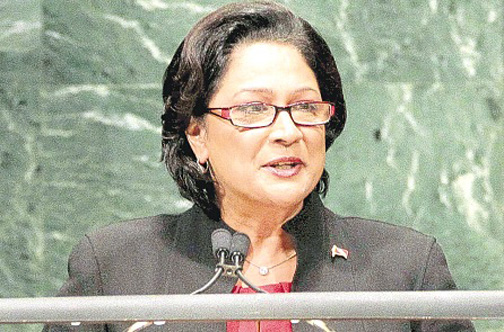PORT OF SPAIN, Trinidad – Prime Minister Kamla Persad-Bissessar yesterday announced this country will be seeking to purchase a Long Range Vessel (LRV) from China “in the shortest possible time”.
According to a release from the Office of the Prime Minister yesterday, Persad-Bissessar convinced Chinese Premier Li Keqiang the Trinidad and Tobago Coast Guard “needed two vessels to lock down this country’s borders in light of the increase in arms and narco trafficking”.
Persad-Bissessar is currently on a State visit to China with a delegation from this country, including several Cabinet members.
“The Prime Minister said she was aware that China was building two LRVs and pleaded with Li Keqiang to sell one ‘in the shortest possible time’,” according to the release.
“National security remains the number one priority of my Government right now,” Persad-Bissessar told Li Keqiang, according to the release.
National Security Minister Gary Griffith yesterday sought to debunk comparisons of the possible acquisition of the LRV to the purchase of Offshore Patrol Vessels (OPVs) that had been scrapped by the People’s Partnership in 2010.
Griffith said the LRV is “far superior, cheaper, more effective and better prepared for the type of situation” we have here. He said the OPV purchase was “littered with irregularities and flaws”.
In 2007, the previous People’s National Movement administration signed a £150 million contract with a company called VT Shipbuilding to build and commission the vessels to patrol local waters and provide naval protection and surveillance.
British defence manufacturer BAE Systems eventually acquired VT Shipbuilding in 2009.
In 2010, months after assuming office, the People’s Partnership Government cancelled the contract, saying the vessels were not built according to specifications.
Speaking at a news conference yesterday at the Ministry of National Security’s head office at Temple Court, Abercromby Street, Port of Spain, Griffith said the LRV purchase cannot be compared to that of the OPVs.
Griffith claimed 17 countries have taken legal action against BAE as a result of kickbacks paid to government officials.
He said the OPVs would not have served a proper function without being backed by intelligence. “You could put a hundred OPVs around a shoreline and it would be of no value if you do not have intelligence to pinpoint where our borders are being infiltrated,” Griffith said.
Griffith said that is why he reenergised the security cooperation agreement between this country and Venezuela and Colombia.
He said the LRVs are to be part of the maritime puzzle to be implemented.
“The whole concept of a maritime security wall is not just about Long Range Patrol vessels. It involves a three-tiered approach which involves the acquisition of hovercraft interceptors floating coastal platforms, UAVs (Unmanned Aerial Vehicles), helicopters; so it is a whole concept of pieces being put together to have a proper jigsaw puzzle locked in to secure our borders,” Griffith said.
“The long range patrol vessels are important but that is something to secure our exclusive economic zone, which is from the north and the east coast from 12 to 200 miles north and east of Trinidad and Tobago,” he said.
Griffith said the purchase of the OPVs would not have been beneficial to taxpayers.
“The BAE OPVs were just about $800 million. We have now gone to China, Korea, Colombia, Holland, Israel; we have gone to several countries with the similar-size vessels but, strange enough, it is about $400 (million) to $500 million,” Griffith said.
Griffith said the OPVs had “defects” and “we did not have the manpower strength at the time”.
“We have done our research and we realise you do not need three OPVs to secure our exclusive economic zone. You need one, maybe we need two for a roll over,” he said.
Griffith said the purchase of vessels will be backed by the inputs of professionals, and not politicians forcing their ideas.
“Whatever vessel we purchase, whatever assets we acquire, we are doing it not through politicians selecting something, but through our experts. We do have a Naval Implementation Team and that team has travelled and looked at the vessel (LRV),” he said.
“They have looked at the Chinese vessel, a vessel from Hyundai in Korea and Colombia, and what they said is that all these vessels have proven to be by far superior, cheaper, more effective and better prepared for the type of situation we have here,” he said.
Griffith said several purchases made on behalf of the Coast Guard have not been appropriate. “We need to ensure that this will be the right vessel. I have no intention for use to purchase white elephants where we continue to buy the wrong thing and then we are caught,” Griffith said.
“I can refer to the Coast Guard in the last administration. They purchased six Austal Patrol vessels and they were not the types of vessels for our waters. They are all down. They last acquired 12 Interceptors, they are all down and it has nothing to do with the Coast Guard. It has to do with this was actually imposed on the Coast Guard without the input of the Coast Guard,” he said.
TRINIDAD EXPRESS










